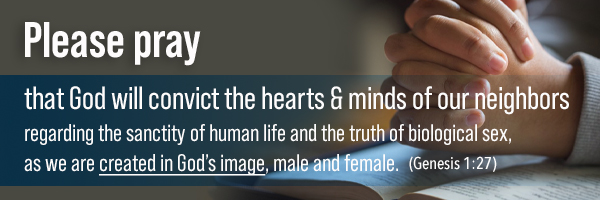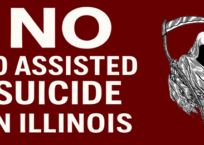
The dangerous physician-assisted suicide bill (SB 1950) is now on Governor JB Pritzker‘s desk awaiting his action. We want to encourage you to pray that he is convicted to veto this legislation and reject the notion that suicide is a legitimate medical treatment. We also want to encourage you to continue to make calls (217-782-6830) and/or send emails (webform link) to his office to let him know you object to this proposal.
Governor Pritzker has 60 days to act. He can either veto this bill, sign it into law, or do nothing and it will automatically go into law.
Take ACTION: Please click HERE to email Governor JB Pritzker today and urge him to veto SB 1950. Tell him Illinois must protect the vulnerable — not promote assisted suicide as a so-called “solution.”
In Mark 12:28–31 and Matthew 22:35–39, Jesus identifies the greatest commandment—loving the Lord our God with all our heart, soul, and mind. But He doesn’t stop there. He immediately adds the second: “You shall love your neighbor as yourself.”
Genuine love for our neighbor means refusing to stay silent when public policies promote despair, devalue life, or encourage suicide. Scripture is unmistakably clear about our responsibility: Proverbs 24:11 tells us
Deliver those who are being taken away to death,
And those who are staggering to slaughter, Oh hold them back.
Did you know? Suicide isn’t an isolated act—it’s contagious. Decades of research confirm the Werther effect: when suicide is normalized, publicized, or framed as a “solution,” vulnerable people are far more likely to imitate it. Assisted-suicide laws dramatically increase this risk by normalizing a deadly cultural message that some lives are no longer worth living. Instead of offering hope, connection, mental-health support, or genuine palliative care, these laws legitimize despair and fuel a dangerous copycat effect—especially among the depressed, the elderly, and those who already feel like a burden.
A society that expands suicide as a “healthcare option” should not be surprised when more people choose it. Dr. Matthew Eppinette of The Center for Bioethics & Human Dignity, warned members of the Illinois Senate Executive Committee earlier this year about suicide contagion. The following video of his testimony is less than 6 minutes long, and well worth your time:

More Alarming Facts About Assisted Suicide
1. Most patients choose assisted suicide due to fear and despair, not pain.
Data from Oregon and other states consistently show that the top reasons people seek assisted suicide are loss of autonomy, feeling like a burden, loss of dignity, and depression — not uncontrolled physical pain. This means assisted suicide often targets people who need compassion, mental-health care, and community, not a lethal prescription.
2. Depression and mental illness are rarely screened out.
In states where assisted suicide is legal, less than 5% of patients are ever referred for a psychological evaluation — even though depression is a major driver of suicide requests. This means vulnerable, mentally fragile people can receive life-ending drugs with no meaningful psychiatric review. SB 1950 has no such requirement for those who would seek assisted suicide in Illinois.
3. There are no real safeguards against coercion.
So-called “safeguards” rely entirely on paperwork and self-reporting, but no independent witness is required at the time the drug is taken. Elder abuse experts warn that coercion is almost impossible to detect once a family member, caregiver, or heir pressures a frail person behind closed doors.
4. Slippery-slope expansion is not hypothetical — it’s already happening.
Countries that legalized assisted suicide (Netherlands, Belgium, Canada) expanded it to:
- people with mental illness,
- people with disabilities,
- children,
- and even those who are just “tired of life.”
5. Insurance companies have denied treatment — but offered assisted suicide instead.
There are multiple documented cases where insurers refused to cover life-saving or life-extending care but would cover the cost of lethal drugs. That makes assisted suicide a cost-savings measure, not a compassionate option.
6. Misdiagnoses and prognostic errors are common.
Studies show 10–20% of medical diagnoses are wrong and prognoses are notoriously unreliable. Yet assisted-suicide laws assume doctors can accurately predict a patient’s remaining lifespan.
7. Disability-rights organizations are overwhelmingly opposed.
Virtually every major disability-rights group — including Not Dead Yet — strongly opposes assisted suicide, warning it creates a two-tier value system that deems some lives “less worth living.” Here in Illinois, Access Living has been vocal opponents of SB 1950.
Please pray
Ask the Lord to convict the heart and mind of Governor Pritzker — that he would see the grave consequences of normalizing suicide and that he would refuse to sign SB 1950 into law. May God stir his conscience, overwhelm him with truth, and lead him to protect every vulnerable life in our state.
Read more:
Western Australia’s assisted suicide rate surges 63% as families praise ‘slick’ death process
(LifeSiteNews)
Evil: US patients offered assisted suicide instead of medical care
(LiveAction)
Medical assistance in dying (MAiD) has gone far further, far faster than was promised
(The Hub)
Dying from Compassion
(National Catholic Register)
Top Reasons to Oppose Assisted Suicide
(USCCB)
Physician-assisted suicide is fundamentally incompatible with the physician’s role
(AMA)
What Is Assisted Suicide, and Why Should You Care About It?
(Kevin Theriot – ADF)
Four Problems with Physician-Assisted Suicide
(Dr. Ryan Anderson)

























